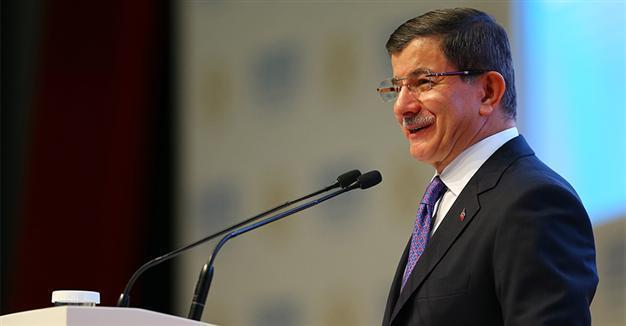Alevi worship houses to get legal status as Turkish gov't pledges ambitious plans
Serkan Demirtaş - ANKARA

Prime Minister Ahmet Davutoğlu outlines the Justice and Development Party's (AKP) action plan for 2016 during a press conference on Dec. 10, 2015. AA Photo
Turkish Prime Minister Ahmet Davutoğlu has outlined a set of comprehensive action plans for the fulfillment of pre-election promises to different segments of society, particularly on the status of Alevis.
Importantly, Davutoğlu is set to provide a legal status to the place of worship of the country’s Alevi community, although it remains unclear whether the government will recognize them as official houses of worship in line with Alevis’ demands.
Although the new constitution was not among the government’s reform plan, Davutoğlu reiterated his call on opposition parties to change the junta-made charter with a pro-freedom one.
The 64th government’s action plans were made public on Dec. 10 at a meeting at the Ankara Congresium with the participation of nearly 3,000 Justice and Development Party (AKP) members, as well as senior civil servants from all ministries.
“There will be no excuse. These action plans and reforms will be realized within their time frame and they will start to be implemented as planned,” Davutoğlu told the audience.
Davutoğlu detailed the reforms to be undertaken over the next three, six and twelve months, as well as the action plans for the fulfillment of election promises again within the same periods.
Legal status to be given to Alevi houses of worship
The government is set to establish a commission for the coordination and monitoring of reforms under the responsibility of deputy Prime Minister Lütfi Elvan. Among the reforms to be concluded within the first three months are the legislation of a political ethics law, an increase in the transparency of political financing, a pledge of legal status to traditional cultural centers and houses of worship (cemevis) for Alevis, the launch of new efforts to resolve the problems of the country’s Roma people, the passage of laws for the protection of personal data and the removal of undemocratic articles from the country’s acquis.
Among these reforms, the motion regarding cemevis is of critical importance as Alevi citizens have long pressed the government to acknowledge cemevis as official houses of worship. However, the government’s plan only underlines that a legal status will be given to these places so that the government can meet their logistical needs.
Reserves on international treaties to be withdrawn
The government’s six-month reform plan envisages important measures for the further democratization of Turkey. The plan promises the withdrawal of all reservations Turkey had inserted on international treaties and conventions in a bid to strengthen the use of fundamental rights and freedoms. The plan also includes reinforcing the efficiency of different human rights organizations and the ombudsman so that they can better monitor government moves on human rights.
On justice, some authorities of high courts over lower courts will be curbed and measures will be taken for citizens to better attain justice. The six-month reform plan also envisages the writing of a new law on higher education and the establishment of a commission to measure the education quality of universities. In the same period, a road map for a digital Turkey will be established, while a strategy for e-state will also be achieved.
New election law and threshold
The government’s one-year reform plan also includes important structural changes. One of the changes is to write a new election law and to pass a new regulation on the election threshold but without detailing whether it will be reduced from the current 10 percent. New laws on political parties to strengthen in-house democratic processes; on civil society to better regulate it through strengthening their legal status and on state secrets to define what is a state secret are among the proposed moves.
An overhaul on the state employee law is also expected to be among the reforms enacted within the next year.
Call for new charter
“However, there is a bigger issue,” Davutoğlu said when he finished reading his governmental action and reform plans. “You all know; this is about the new constitution. This issue of the new constitution should be resolved by all of us, all together,” he said. Repeating his call to opposition parties to come together to amend the constitution so that it embraces all 78 million people of the country, Davutoğlu said: “There is a need for the support of the whole society. We should be able to get rid of this disgraceful constitution as a residue of the Sept 12 coup d’état.”
The prime minister said he would seek appointments from all opposition leaders in the coming weeks to discuss the new constitution and other governmental promises for the democratization process.
